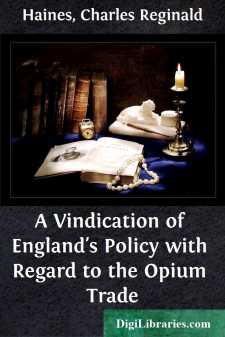Categories
- Antiques & Collectibles 13
- Architecture 36
- Art 48
- Bibles 22
- Biography & Autobiography 813
- Body, Mind & Spirit 138
- Business & Economics 28
- Children's Books 12
- Children's Fiction 9
- Computers 4
- Cooking 94
- Crafts & Hobbies 4
- Drama 346
- Education 46
- Family & Relationships 57
- Fiction 11821
- Games 19
- Gardening 17
- Health & Fitness 34
- History 1377
- House & Home 1
- Humor 147
- Juvenile Fiction 1873
- Juvenile Nonfiction 202
- Language Arts & Disciplines 88
- Law 16
- Literary Collections 686
- Literary Criticism 179
- Mathematics 13
- Medical 41
- Music 40
- Nature 179
- Non-Classifiable 1768
- Performing Arts 7
- Periodicals 1453
- Philosophy 64
- Photography 2
- Poetry 896
- Political Science 203
- Psychology 42
- Reference 154
- Religion 505
- Science 126
- Self-Help 81
- Social Science 81
- Sports & Recreation 34
- Study Aids 3
- Technology & Engineering 59
- Transportation 23
- Travel 463
- True Crime 29
A Vindication of England's Policy with Regard to the Opium Trade
Description:
Excerpt
A VINDICATION OF ENGLAND’S POLICY WITH REGARD TO THE OPIUM TRADE.
Again there has been a debate in Parliament on the opium traffic:
again has the same weary series of platitudes and misrepresentations been repeated, and no one has taken the trouble to defend the policy of England as it should and can be defended. But it is high time that the falsities and the fallacies of the statements of the Anti-opium Society should be exposed, and that everyone to the best of his ability should enlighten the people of England on a subject which so nearly concerns the honour of our country. Isolated voices have indeed been raised to protest against the views disseminatedby the Society for the Abolition of the Opium Trade; but these efforts have been too few and far between to reach the mass of the nation. At present the agitators have it all their own way. The majority of people, having heard nothing but what the agitators have told them, denounce the iniquitous traffic with a fervour that varies proportionately with their ignorance. In contemplating the success of this misdirected enthusiasm we are irresistibly reminded of a very “judicious” remark of Hooker’s, who says: “Because such as openly reprove supposed disorders of State are taken for principal friends to the common benefit of all, and for men that carry singular freedom of mind; under this fair and plausible colour whatsoever they utter passeth for good and current.”For more than forty years the opium trade between India and China has been a subject for keen discussion and hostile comment in England. Being as it was the immediate cause of our first war with China in 1840, the opium traffic could not fail, in Parliament and elsewhere, to be brought prominently before the notice of the people of England, and of course there were not wanting public men to denounce the policy pursued by this country towards China in that matter. This denunciation, at first of a vague and desultory character, took a definite shape in the memorial presented to Her Majesty’s Government in the Earl of Shaftesbury’s name, and backed by all his great personal authority. The specific charges contained in this document will be noticed hereafter, when we come to sketch the present position of the “Society.” Suffice it here to say that it teemed with misstatements and exaggerations of the grossest and most palpable kind, which, having been exposed and refuted again and again, need not detain us now. But so far were those random statements from furthering the cause which the memorialists had at heart, that they only served to steel the minds of unprejudiced people against further representations, however just, from the same quarter.
Since then, however, the agitation has taken a more organized form, and there is now a society for the suppression of the trade, numbering its hundreds of supporters, and linked with the names of such men as Lord Shaftesbury, Cardinal Manning, Sir J. W. Pease, and Sir Wilfrid Lawson. Nearly the whole of the clergy from the Archbishops downwards, and ministers of every denomination, have declared for the same side....



